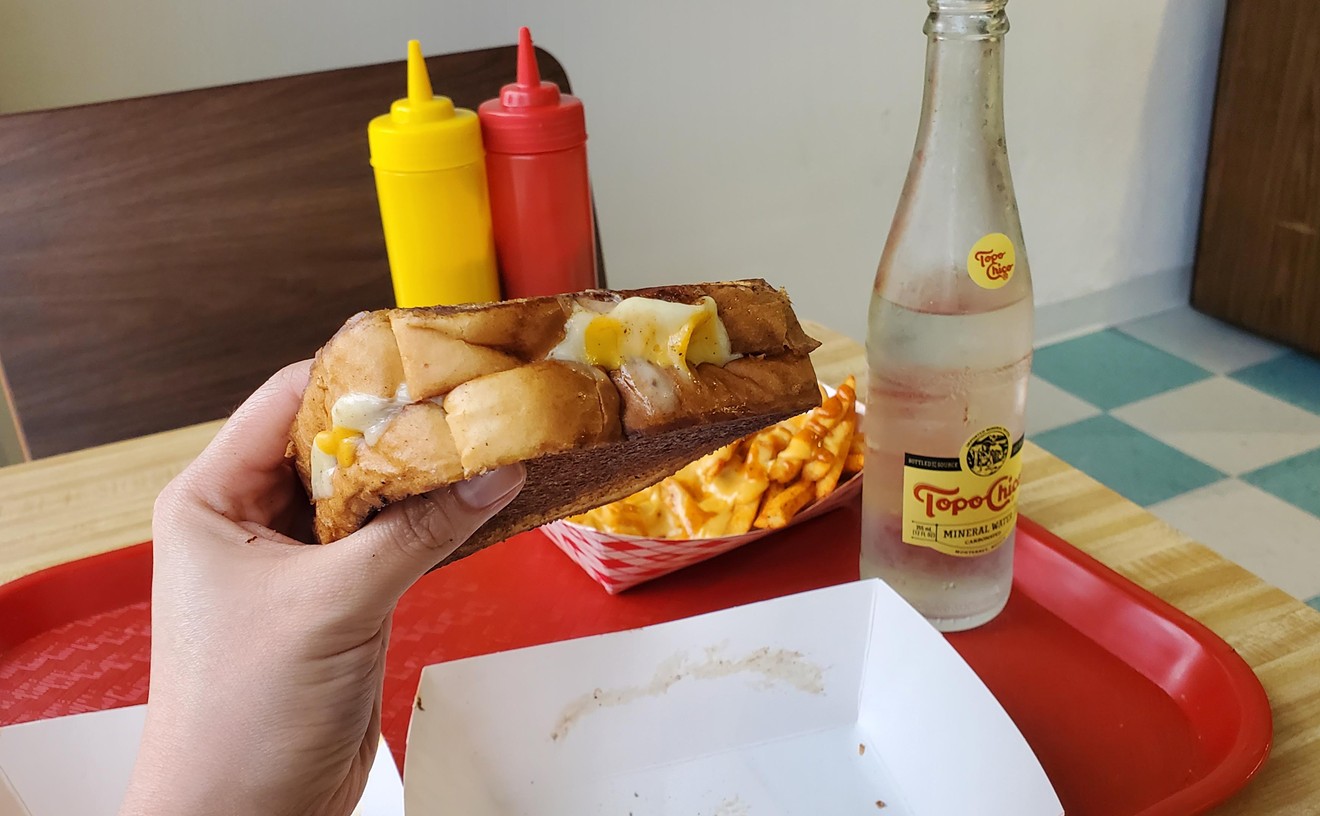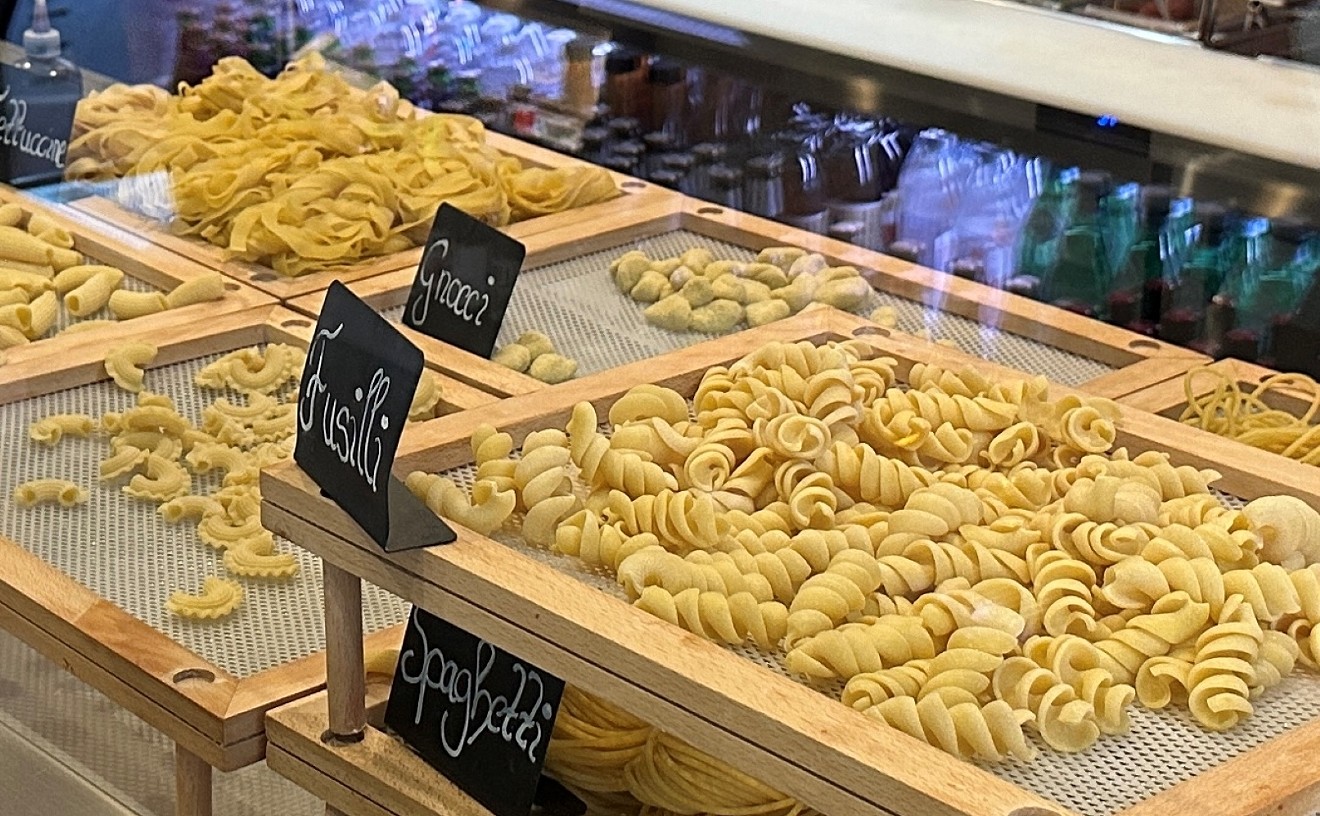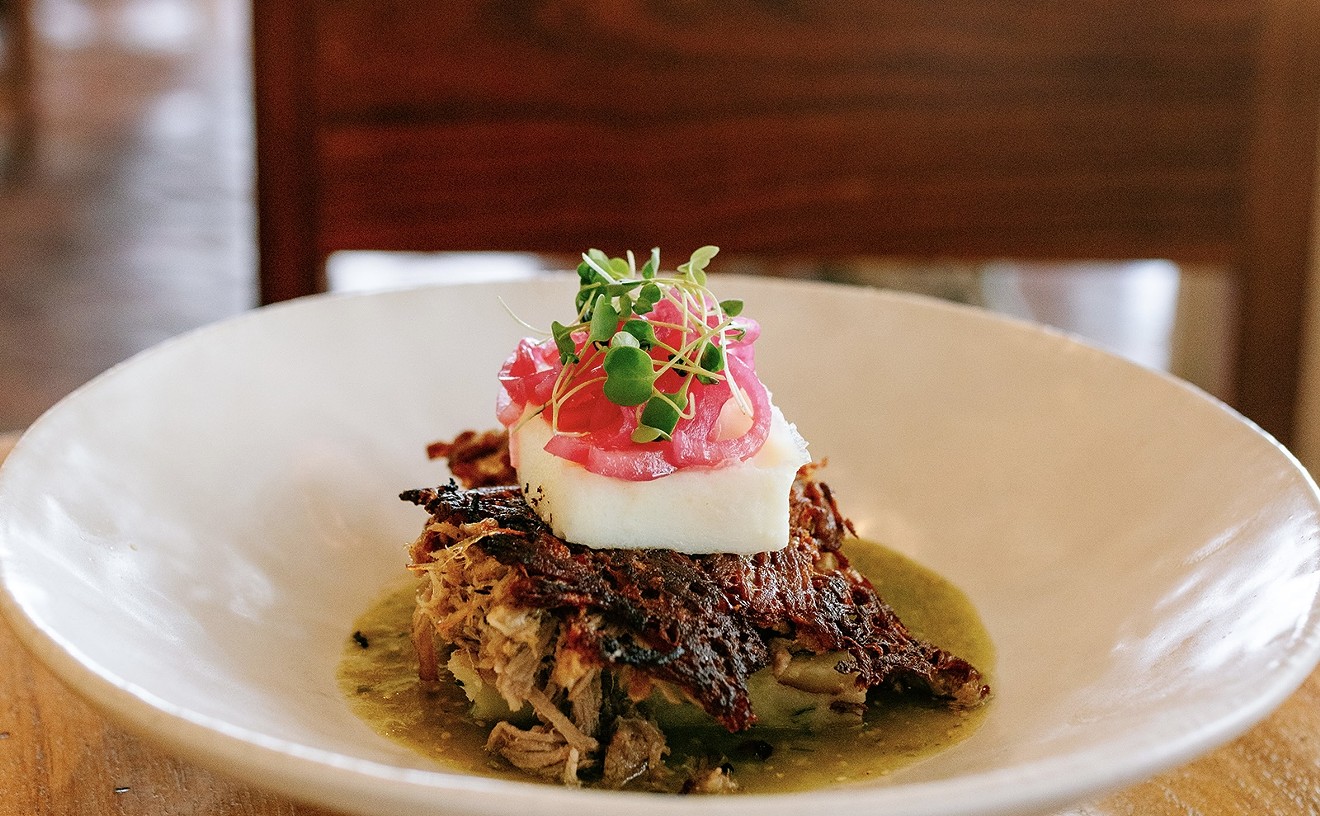I've been told that men are simple creatures—assuming "my eyes are up here" means something along the lines of "simple." And a pig is, after all, a creature.
Well, not so much been told. Let's just say I've heard second-hand—yeah, that's it—some of these untoward remarks. On the plus side, most of us guys are forgiving sorts. Really. For instance, there I was, sitting in a dark corner of Tei An watching as an Asian family reverently slurped up their noodles. Such manners are considered ill by most Americans. Even at non-elitist tables, mothers scorn that sloppy inhaling sound. In Japan, however, it's perfectly acceptable to really get in there and s-l-u-r-r-r-p. At the same time, my dinner companion struggled with a bowl of udon served in murky broth. The long, gooey strands slithered from her chopsticks, slipping one after another onto the table, accompanied by little screams of futility. Her solution involved picking up wayward noodles by hand.
OK, probably not the most couth of behaviors but what the hell. Tall, blond...no big deal.
Besides, this is more in the nature of a cautionary tale. While most Japanese restaurants in Dallas wrap themselves around sushi, Tei An specializes in noodles, spaghetti-like soba and the larger, though still wriggly udon—difficult little bastards for chopstick novices. And although the restaurant occupies part of that steel and glass oxymoron known as One Arts Plaza, the room itself is serene, almost respectful. It's not the place for noisy, amateur high jinks.
No, Tei An is an authentic restaurant, a real restaurant, one with a sense of purpose. Owner Teiichi Sakurai ditched his groundbreaking destinations, Teppo and Tei Tei Robata Bar, to study the mysteries of soba. Aficionados of the buckwheat noodles will even drink the water leftover after cooking, swirled into whatever remains of the dipping sauces.
Of course, the Japanese consider karaoke a form of entertainment.
The sauce mixes are not bad, though. The restaurant's apparent sarashina-style soba lends a faint musty flavor to the water—enough to calm each sauce without washing out the character. Tsuyu, a traditional soy condiment, resembles fermented toast. The charred sesame variation looks something like squid ink but clings to a mild taste under the initial acrid singe. Their walnut sauce etches a sharpened edge into the earthy cooking residue. These are not, mind you, robust sauces. The prize here is subtlety—flavors drape lightly over soba. Enjoyment comes from the noodle's unique flavor and inscrutable texture. Perhaps that's why the ritual of sipping the dregs emerged. One can fully appreciate each sauce only as a drink.
For locals, the Texas pecan dip may leave the most lasting impression: a soft, nutty, gritty base barely muzzling its harsher, bitter tone. It's one of Tei An's few nods to fusion. Oh, they approach the ridiculous once...make that twice, the second being a deliberately whimsical soba carbonara, which hardly counts against them. The kitchen's most obvious flirtation with trendy ingredients is green tea-laced shrimp tempura. Dark streaks from the calming, health-giving, life-extending, acne-clearing, solve-everything leaf seem to undermine the tempura crust, turning it into a sodden mass. Hell, why not go the distance: green tea tempura with pomegranate reduction and eggplant caviar? Fortunately, Sakurai refuses to fall for the Uptown trap, where ingredients double as buzzwords. And he employs a brilliantly conceived yuzu emulsion to rescue the shrimp. Tangy, full of grit and ripe citrus, the sauce awakens dulled shellfish and draws out the dry, grassy flavor of green tea.
Perhaps curry soba approaches that fuzzy line between authenticity and fusion, as well. But here "curry" becomes a carefully balanced stock, revealing itself in layers—husky, almost soil-like at first, yielding to a bitter streak followed by a wave of heat that ebbs away reluctantly. Duck soba is more appropriately dutiful. Immersed in thinned-out, soupy tsuyu, the flavors are dense but courtly. The mellow envelope of creamy earth nipped by fermented zest, but sealed with the smoky haze of grilled negi (green onion).
In other words, it's pretty good.
Curry and duck exemplify hot soba. The Japanese, however, prize cold noodles served with dipping sauce. Cooking and bathing soba according to a precise ritual lends that confounding stretchy-delicate consistency. Udon, the variety that so vexed my companion one evening, is more common stuff: thick, pale and chewy. It also leaves sticky trails on the table. We ordered it with mixed tempura, this time sans tea and thus gossamer crisp.
Sorry, no ramen at this place—a disappointment to OU grads, I'm sure. But I guess if one really craves processed food, the restaurant's presentation of fishcake would suffice. Kamaboko sounds nasty, like American grocery store "krab" or something spewed from the Bass-a-Matic: junk whitefish of dubious ancestry, pureed and pressed and shaped into loaves. Instead of packaging this delicacy in cans marked Friskies, Japanese chefs subject it to steam, tightening the mass into a firm, compact, tasteless whole. Tei An's kitchen renders this perfectly. Sloshed through soy sauce, it actually pulls woody, cindered flavors. Fishcake is, however, an acquired taste, one usually encountered on this continent in soups.
Americans have grown accustomed to nori in its drab olive form. But the restaurant's white seaweed salad, tossed in mirin, jumps on the palate. Rubbery yet somehow frail, brightened by cucumber and carrot, it presents in one dish the range of texture, flavor and appearance so important in a Japanese meal.
All-American slabs of beef, on the other hand...well, here it's just like you find at Sakurai's previous haunts, crimson strips of meat webbed with stark fat are set across a hot stone pad and left to sizzle. It's only for a moment, but in that brief span rich fat seeps into timid fibers of beef. After a quick turn, the waitress—they do all the work for you—swipes each small piece through soy and returns it to the stone. This burns a sweet, malty patina onto some of the beefiest slices of red meat.
Smoking, popping—it's about the only real break from Tei An's overwhelming reserve. Although it looks from the valet stand like a corporate entryway, the space inside is urbane and sophisticated and probably reeks of feng shui, if I cared to look up the conventions of feng shui, which I don't. (Oh, you say it's Chinese? Thought it was Californian.) Let's just say it's an open, flowing area, smartly attired in concrete and wood. Conversation from the bar wafts clearly through the room. So be forewarned: mouth off about, oh, editors and you could find your stuff moved to the intern's cubicle. More judicious diners lean in and converse quietly. They don't brazenly compare the restaurant's omelet and fruit-stuffed caipirinha to the perfect brunch.
Oh, but the "Iichiko" caipirinha is nothing like the brutish, summertime, mind-numbing concoction found at Dallas happy hours. Instead, it's loaded with fresh fruit, fruit drenched in alcohol and just plain alcohol—a healthy means to an end. It's probably the reason one of us ended up playing with a gizmo in the bathroom that turns clear glass into gray frost.
Like I said, it's a real soba house—for the most part. Trouble occurs only in those moments when they break from tradition...or when Texans mess with artifacts of the Far East.
1722 Routh St. (One Arts Plaza), 214-220-2828. Open 11:30 a.m.-2 p.m., 5:30-10:30 p.m. Monday-Friday, 5:30-10:30 p.m. Saturday. $$$










